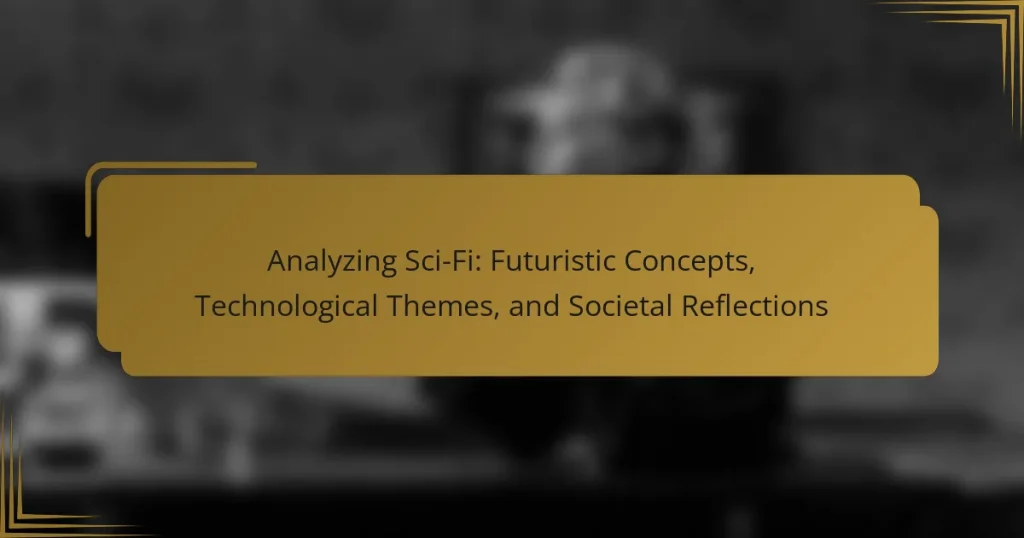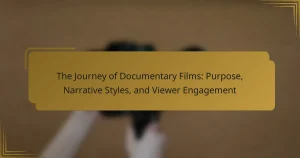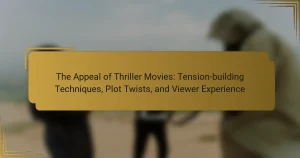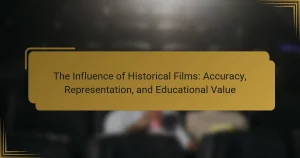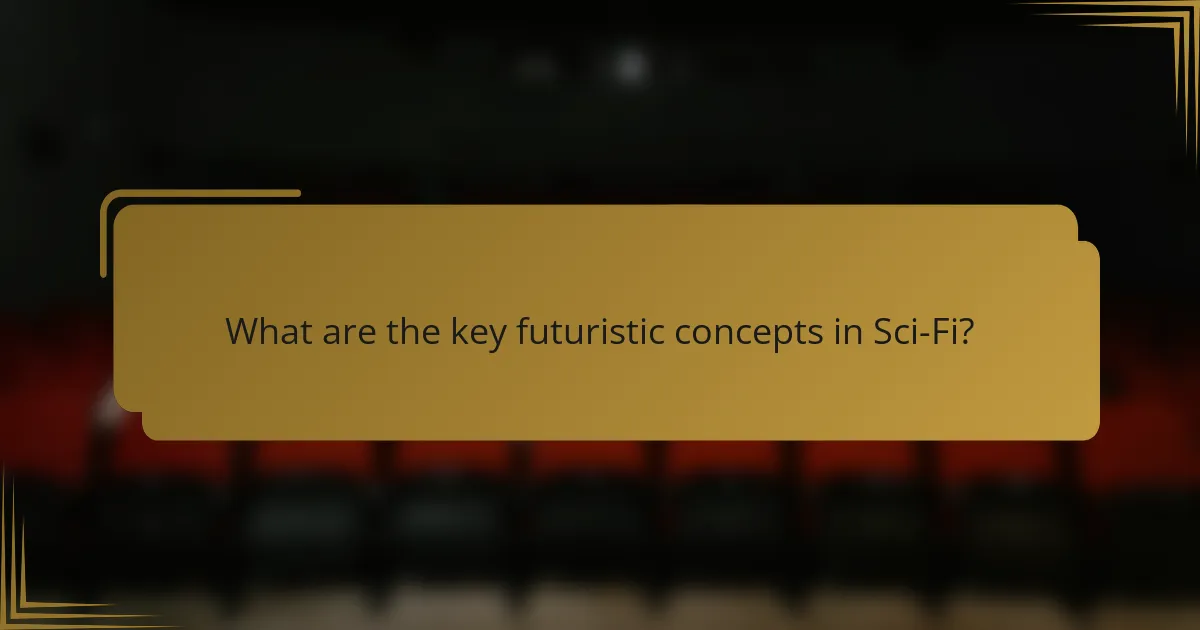
What are the key futuristic concepts in Sci-Fi?
Key futuristic concepts in Sci-Fi include artificial intelligence, space exploration, and advanced biotechnology. Artificial intelligence often portrays sentient machines that can think and learn independently. Space exploration encompasses interstellar travel and colonization of other planets. Advanced biotechnology explores genetic engineering and human enhancement. These concepts reflect current technological trends and societal concerns. They often raise ethical questions about humanity’s future. Sci-Fi serves as a platform for exploring these possibilities. It challenges readers to consider the implications of rapid technological advancement.
How do these concepts shape our understanding of the future?
Futuristic concepts in sci-fi shape our understanding of the future by presenting imaginative scenarios and technological advancements. These narratives often explore potential societal changes driven by innovation. For instance, themes like artificial intelligence and space exploration challenge our perceptions of human capabilities. They encourage critical thinking about ethical implications and societal impacts. Sci-fi serves as a reflection of contemporary issues, allowing us to envision future solutions. By analyzing these concepts, we can better prepare for real-world developments. This genre stimulates dialogue about the direction of humanity and technology. Ultimately, it influences our expectations and aspirations for the future.
What role does imagination play in developing futuristic concepts?
Imagination is crucial in developing futuristic concepts. It allows individuals to envision possibilities beyond current realities. This creative thinking fosters innovation in technology, society, and culture. Historical examples include the invention of the internet and space travel, both born from imaginative thinking. Imagination encourages exploring new ideas and solutions to contemporary challenges. It also helps in predicting future trends and societal shifts. Ultimately, imagination drives progress and inspires the creation of transformative concepts.
How do societal values influence futuristic concepts in Sci-Fi?
Societal values significantly shape futuristic concepts in Sci-Fi. These values reflect contemporary beliefs, ethics, and concerns. For example, environmental issues influence narratives about sustainable technologies. Works like “Dune” showcase ecological themes relevant to modern climate discussions. Additionally, social justice movements inspire stories that explore equality and diversity. “Black Panther” reimagines African culture within a futuristic context, reflecting current societal aspirations. Furthermore, technological advancements raise ethical questions in Sci-Fi. Stories often examine the implications of AI and surveillance, mirroring real-world debates. Overall, Sci-Fi serves as a mirror to society, projecting its values into imagined futures.
What are some notable examples of futuristic concepts in literature and film?
Notable examples of futuristic concepts in literature and film include “Blade Runner,” which explores artificial intelligence and identity. “The Matrix” depicts a simulated reality controlled by machines. “Neuromancer” introduces cyberspace and virtual reality. “Dune” presents advanced technology and ecological themes. “Gattaca” examines genetic engineering and societal implications. These works reflect concerns about technology’s impact on humanity and society. Each concept raises questions about ethics and the future of civilization.
How do these examples reflect contemporary issues?
These examples reflect contemporary issues by illustrating current societal anxieties and technological advancements. Sci-fi often mirrors real-world concerns, such as climate change and surveillance. For instance, narratives featuring dystopian futures highlight fears about environmental degradation. Additionally, themes of artificial intelligence in these stories echo ongoing debates about ethics in technology. These reflections prompt audiences to consider the implications of their choices today. By engaging with these themes, sci-fi serves as a lens through which to examine pressing modern challenges.
What impact do these examples have on popular culture?
These examples significantly influence popular culture by shaping societal perceptions of technology and the future. They introduce innovative ideas that inspire real-world technological advancements. Sci-fi narratives often reflect contemporary societal issues, prompting discussions and critical thinking. For instance, films like “Blade Runner” explore themes of identity and humanity, resonating with audiences. This fosters a cultural dialogue about ethics in technology and artificial intelligence. Additionally, popular sci-fi works often lead to the creation of dedicated fan communities. These communities further propagate the themes and ideas presented, amplifying their cultural impact. Overall, these examples serve as both entertainment and a lens through which society examines its values and aspirations.
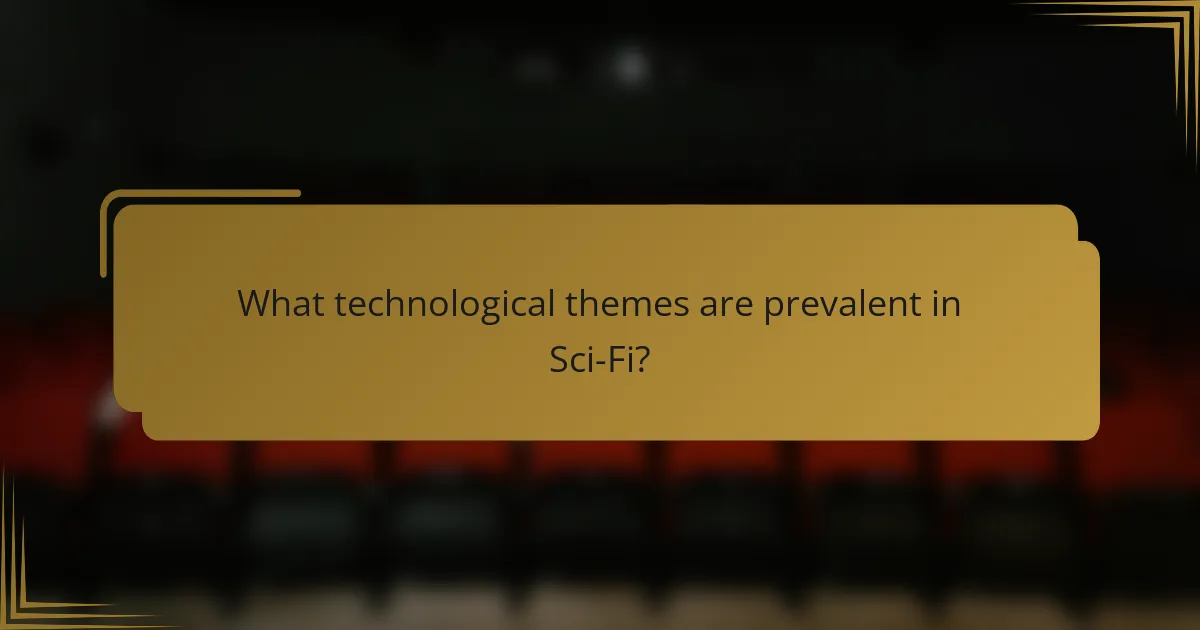
What technological themes are prevalent in Sci-Fi?
Technological themes prevalent in Sci-Fi include artificial intelligence, space exploration, and virtual reality. Artificial intelligence often explores the implications of sentient machines. Space exploration delves into human expansion beyond Earth. Virtual reality examines immersive digital environments. Other themes include biotechnology, cybernetics, and nanotechnology. Biotechnology focuses on genetic engineering and its ethical dilemmas. Cybernetics studies the integration of humans and machines. Nanotechnology investigates materials at the molecular level. These themes reflect societal concerns about technology’s impact on humanity.
How do these themes relate to current technological trends?
Current technological trends reflect themes of innovation and societal change found in sci-fi. These themes often explore advancements in artificial intelligence, virtual reality, and biotechnology. For example, AI’s rapid development mirrors sci-fi narratives about intelligent machines. Virtual reality technologies are increasingly used in entertainment and education, aligning with sci-fi explorations of immersive experiences. Additionally, biotechnology advancements, such as CRISPR, echo sci-fi discussions on genetic engineering. These connections illustrate how sci-fi serves as a predictive lens for understanding technological evolution and its societal implications.
What technologies are frequently depicted in Sci-Fi narratives?
Common technologies depicted in Sci-Fi narratives include artificial intelligence, space travel, and advanced robotics. Artificial intelligence often plays a central role in storylines, showcasing sentient machines and their interactions with humans. Space travel is frequently illustrated through advanced spacecraft, enabling exploration of distant planets and galaxies. Advanced robotics is portrayed in various forms, from humanoid robots to automated systems that assist or challenge human characters. Other notable technologies include virtual reality, time travel devices, and biotechnology, which explore the implications of human enhancement and genetic manipulation. These technologies reflect societal concerns and aspirations, often serving as metaphors for contemporary issues.
How do these technologies challenge our ethical considerations?
Technologies challenge our ethical considerations by introducing dilemmas regarding privacy, autonomy, and accountability. Advanced technologies like artificial intelligence and biotechnology can infringe on individual privacy rights. For instance, AI surveillance systems can track personal behaviors without consent. Additionally, these technologies may compromise individual autonomy by automating decision-making processes. Autonomous vehicles, for example, raise questions about liability in accidents. Furthermore, the use of biotechnology in gene editing poses ethical issues surrounding consent and potential misuse. The CRISPR technology illustrates the potential for unintended consequences in altering human genetics. These challenges necessitate ongoing discussions about ethical frameworks to govern technological advancements.
What are the implications of technological themes in Sci-Fi?
Technological themes in Sci-Fi explore the potential consequences of advanced technology on society. These narratives often reflect concerns about ethics, human identity, and environmental impact. For instance, AI in Sci-Fi can illustrate fears of loss of control over technology. Works like “Blade Runner” highlight the moral dilemmas of artificial intelligence. Additionally, themes of surveillance in Sci-Fi raise questions about privacy and freedom. The portrayal of dystopian futures serves as a cautionary tale about unchecked technological advancement. Historical examples, such as George Orwell’s “1984,” emphasize the dangers of totalitarianism enabled by technology. Overall, Sci-Fi serves as a mirror to contemporary societal issues regarding technology.
How do technological themes influence public perception of science?
Technological themes significantly influence public perception of science by shaping understanding and attitudes towards scientific advancements. For instance, portrayals of technology in media often create excitement or fear about scientific developments. The depiction of artificial intelligence in films can lead to both fascination and apprehension among audiences. Research shows that positive representations of technology can enhance public trust in scientific institutions. Conversely, negative portrayals can lead to skepticism and resistance to scientific findings. A study by the Pew Research Center found that 72% of Americans believe science has a positive impact on society, influenced by how technology is presented in popular culture. Thus, the way technology is framed in narratives affects public perception and acceptance of scientific concepts.
What lessons can we learn from technological advancements in Sci-Fi?
Technological advancements in Sci-Fi teach us about the potential impacts and ethical considerations of innovation. They often highlight the dual-edged nature of technology, showcasing both benefits and risks. For example, artificial intelligence in Sci-Fi can enhance productivity but also raise concerns about autonomy and control. Additionally, Sci-Fi explores themes of environmental sustainability, urging us to consider the consequences of technological growth on our planet. Works like “Blade Runner” illustrate the dangers of unchecked technological advancement, prompting discussions on regulation and responsibility. Overall, Sci-Fi serves as a cautionary lens, encouraging reflection on the trajectory of real-world technology.
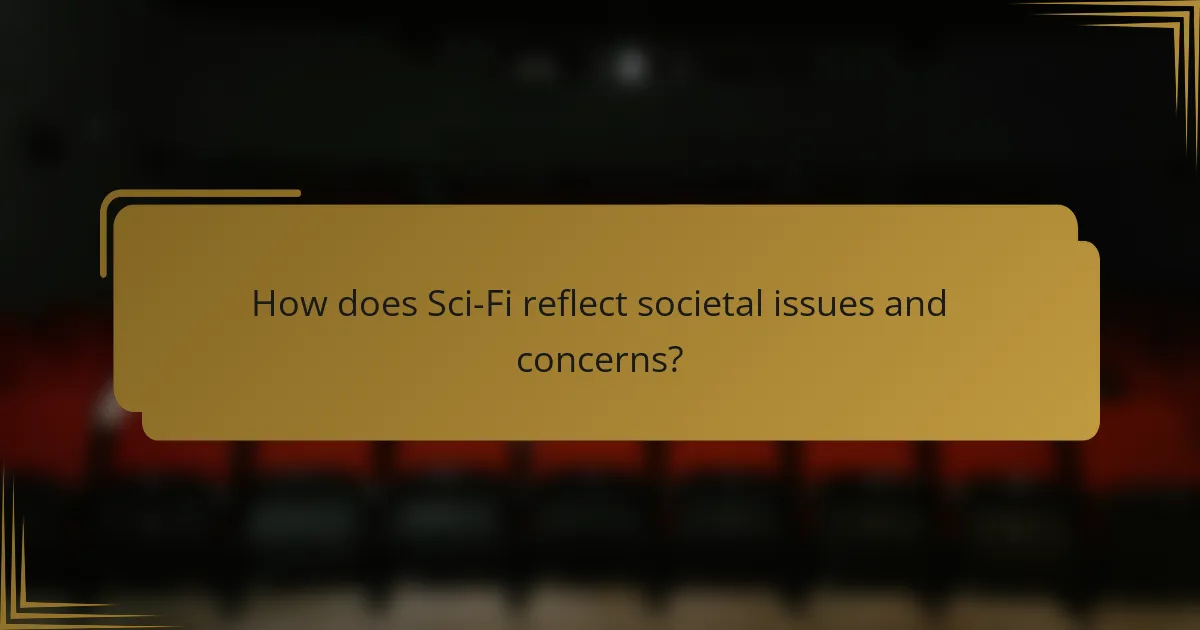
How does Sci-Fi reflect societal issues and concerns?
Science fiction reflects societal issues and concerns by exploring themes such as technology, identity, and ethics. These narratives often serve as a lens to examine contemporary social dilemmas. For instance, dystopian settings highlight fears regarding government control and loss of personal freedom. Works like George Orwell’s “1984” illustrate the consequences of surveillance and authoritarianism. Additionally, sci-fi addresses environmental issues, as seen in films like “Blade Runner,” which critiques urban decay and ecological collapse. The genre also tackles questions of race, gender, and class, providing commentary on inequality. By imagining future scenarios, sci-fi encourages critical reflection on current societal trends.
What societal themes are commonly explored in Sci-Fi?
Common societal themes explored in Sci-Fi include the impact of technology on humanity, social inequality, and environmental concerns. Sci-Fi often examines how advancements in technology can alter human relationships and societal structures. For example, works like “Neuromancer” by William Gibson highlight the implications of cybernetics on identity. Many Sci-Fi narratives also address issues of class disparity, as seen in “Elysium,” where access to technology creates a divide between the wealthy and the poor. Environmental themes are prevalent too, with stories like “The Windup Girl” by Paolo Bacigalupi showcasing the consequences of ecological collapse. These themes reflect contemporary societal anxieties and provoke thought about future possibilities.
How does Sci-Fi serve as a commentary on social justice?
Sci-Fi serves as a commentary on social justice by exploring themes of inequality and oppression. It often depicts dystopian societies that reflect real-world social issues. For instance, works like “The Handmaid’s Tale” highlight gender inequality. “Parable of the Sower” addresses economic disparity and climate change. These narratives provoke critical thought about current social structures. They encourage audiences to question authority and envision alternative futures. Sci-Fi can also amplify marginalized voices, showcasing diverse perspectives. By using speculative scenarios, it challenges societal norms and inspires activism.
What role does Sci-Fi play in addressing environmental concerns?
Sci-Fi plays a significant role in addressing environmental concerns by exploring futuristic scenarios and potential ecological outcomes. It allows audiences to envision the consequences of climate change and environmental degradation. Notable works, such as “The Overstory” by Richard Powers, highlight the interconnectedness of ecosystems. Films like “Interstellar” depict the urgency of finding sustainable solutions for humanity’s survival. These narratives encourage critical thinking about real-world environmental issues. They inspire activism and awareness through imaginative storytelling. By presenting alternative futures, Sci-Fi prompts discussions on sustainability and conservation. Overall, it serves as a catalyst for environmental consciousness and action.
How can analyzing Sci-Fi help us understand our own society?
Analyzing Sci-Fi reveals insights about our own society. Sci-Fi often reflects societal values, fears, and aspirations. For instance, themes of dystopia in works like “1984” illustrate concerns about surveillance and authoritarianism. These narratives encourage critical thinking about current political trends. Additionally, Sci-Fi explores technological advancements and their implications. Stories like “The Matrix” raise questions about reality and human agency in a tech-driven world. By examining these narratives, we can better understand our relationship with technology and its potential consequences. Furthermore, Sci-Fi often addresses social issues like inequality and diversity. Works such as “The Left Hand of Darkness” challenge traditional gender roles. This prompts discussions about identity and social constructs in our reality. Overall, analyzing Sci-Fi serves as a mirror, reflecting and critiquing our societal norms and future possibilities.
What insights can we gain about human behavior from Sci-Fi narratives?
Sci-Fi narratives provide profound insights into human behavior by exploring themes of morality, identity, and societal structure. These stories often depict futuristic scenarios that challenge current ethical dilemmas. For example, works like “Blade Runner” examine what it means to be human in the context of artificial intelligence. This raises questions about consciousness and empathy. Additionally, Sci-Fi often reflects societal fears and aspirations, such as technological dependence and environmental degradation. The narrative of “The Matrix” illustrates the struggle for autonomy against oppressive systems. These stories serve as cautionary tales, prompting reflection on contemporary issues. Research by scholars like Susan Schneider highlights how Sci-Fi can influence public perception and ethical considerations in technology. Thus, Sci-Fi narratives function as mirrors, revealing both the potential and pitfalls of human behavior.
How does Sci-Fi inspire innovation and change in society?
Sci-Fi inspires innovation and change in society by presenting imaginative concepts that challenge current technological boundaries. It often explores futuristic ideas such as artificial intelligence, space travel, and virtual reality. These narratives encourage scientists and engineers to push the limits of what is possible. For instance, the depiction of mobile communication in “Star Trek” led to the development of modern smartphones. Similarly, the concept of autonomous vehicles in “I, Robot” spurred advancements in self-driving technology. Sci-Fi also prompts societal discussions about ethics and the implications of new technologies. This genre encourages critical thinking about the future, influencing public opinion and policy. Overall, Sci-Fi serves as a catalyst for innovation by merging creativity with scientific inquiry.
What practical insights can we derive from analyzing Sci-Fi?
Analyzing Sci-Fi provides practical insights into potential future technologies and societal challenges. Sci-Fi often explores advanced technologies like artificial intelligence and space travel. These narratives can inspire real-world innovations and technological advancements. For instance, the concept of virtual reality in Sci-Fi has influenced the development of modern VR technologies. Additionally, Sci-Fi reflects societal issues such as climate change and inequality. These themes encourage critical thinking about current problems and possible solutions. The genre serves as a lens to examine ethical dilemmas related to technology. By envisioning various futures, Sci-Fi helps society prepare for upcoming challenges.
How can Sci-Fi influence future technological development?
Sci-Fi can influence future technological development by inspiring innovation and shaping societal expectations. Many technologies have emerged from Sci-Fi concepts. For example, the idea of smartphones was popularized by the communicators in “Star Trek.” Additionally, virtual reality has roots in works like “Neuromancer” by William Gibson. Sci-Fi often explores advanced technologies, prompting engineers and scientists to turn fiction into reality. The genre stimulates imagination and encourages problem-solving approaches. Moreover, it raises ethical questions about technology, influencing public discourse and policy. Historical examples show that many inventors cite Sci-Fi as a motivating factor in their work. Thus, Sci-Fi serves as both a creative catalyst and a societal mirror, driving technological advancements.
What strategies can we adopt from Sci-Fi to address real-world challenges?
Sci-Fi offers several strategies to tackle real-world challenges. One strategy is using speculative design to envision future scenarios. This approach helps identify potential consequences of current actions. For example, the book “The Dispossessed” by Ursula K. Le Guin explores anarchist societies, prompting discussions on governance and resource distribution. Another strategy is fostering innovation through technological concepts seen in Sci-Fi. The depiction of renewable energy sources in works like “Star Trek” inspires real-world advancements in sustainability. Additionally, Sci-Fi encourages critical thinking about ethics and social issues. Stories like “Blade Runner” raise questions about artificial intelligence and humanity. These narratives can guide policymakers in addressing ethical dilemmas in technology. Overall, Sci-Fi serves as a valuable tool for imaginative problem-solving and proactive planning.
Analyzing Sci-Fi serves as the primary entity of this article, focusing on futuristic concepts, technological themes, and societal reflections. Key concepts include artificial intelligence, space exploration, and advanced biotechnology, which mirror contemporary technological trends and ethical dilemmas. The article examines how these themes shape public understanding of future possibilities, influence societal values, and reflect current issues such as climate change and inequality. Notable examples from literature and film illustrate these themes, prompting critical discussions about the implications of technological advancements and the role of imagination in envisioning future scenarios. Through this analysis, the article highlights the importance of Sci-Fi in fostering innovation and addressing real-world challenges.
